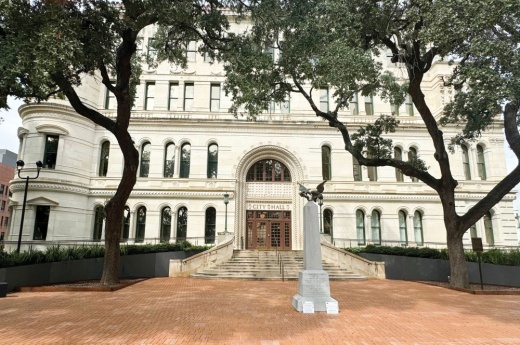The changes include term limits and compensation changes for the mayor and council members, whether city employees can participate in political activity with protections from retribution or job loss, and other proposals. The changes to the city’s charter are the result of findings from a Charter Review Commission established in November.
The term limit and salary changes would bring the city more in line with larger cities like Houston, said Bryan Gervais, professor of political science at The University of Texas at San Antonio.
How we got here
In November 2023, Mayor Ron Nirenberg reconstituted the city’s Charter Review Commission with a revised schedule for the City Council to consider ballot propositions to send to voters in November 2024, according to city documents.
They were charged with addressing Ethics Review Board revisions, council compensation and term limits, city manager tenure and compensation, council redistricting, and updating language in the charter.
City Council voted Aug. 8 on adding propositions E and F separately from the rest of the propositions. Proposition E passed with council members Melissa Cabello Havrda, Manny Peláez and Marc Whyte voting against. Proposition F passed with Marina Alderete Gavito, Peláez and Whyte voting against.
Council voted in favor of propositions A through D unanimously. The city had until a state deadline of Aug. 19 to add a special election to the Nov. 5 ballot, which already has elections for president, federal and state legislative seats, and some Bexar County positions.
The charter amendments can be summed up as follows:
Proposition A
- What it does: Adds a definition of “conflicts of interest” to the city charter. According to city documents, the city’s ethics code contains sections that address these, but the charter itself does not. This also requires sufficient funding for the Ethics Review Board.
- What it does: This proposition exists to clean up and in some cases remove archaic language in the city charter, as well as remove old statutes that have been long superseded by state law.
- What it does: Currently, the city manager is limited to eight years of service, and the most a City Council can opt to pay them is 10 times the lowest-paid city employee. This would remove all limits. Terms of a city manager’s employment would be negotiated by City Council.
- What it does: Currently all city employees are prohibited from any participation in local politics, down to placing signs in their yards. This measure allows city employees participation without retribution within certain parameters, such not while in uniform or on-the-job.
- What it does: This provides a raise for the City Council and mayor to annual salaries of $70,200 and $87,800 respectively, and ties any increases to the U.S. Housing and Urban Development-determined area medium income for a family of four at 80% and 100% AMI respectively.
- What it does: Currently council members and the mayor are elected to two-year terms and serve up to eight years. This measure would change that to four-year terms and serve up to eight years concurrently.
The city of San Antonio was one of the last major metropolitan cities to begin paying its mayor and council a full-time wage instead of a stipend.
Beginning in 1951, the San Antonio City Charter stipulated an annual wage of $1,040 for council members and $4,040 for mayor, according to city records. That salary remained unchanged for about 64 years.
In 2014, council created the Charter Review Commission by ordinance, according to council documents. That first review commission proposed the changes voters then approved allowing council a $45,722 salary and mayor $61,725 in 2015.
Proposition E would provide a raise for the City Council and mayor to annual salaries of $70,200 and $87,800 respectively. All annual future adjustments must correlate to the U.S. Housing and Urban Development-determined income limits for a San Antonio family of four at 80% and 100% of the area median income respectively.
Proposition F
City Council members are currently elected to two-year terms and can be re-elected four times.
District 9 council member John Courage said it is difficult for council members to see city projects through from start to finish within the current system, and supports the switch to four-year terms.
“I see two four-year terms enabling a council member to be, I think, more effective over the long term, and I think even more efficient,” Courage said.
District 10 council member Whyte said he is not in favor of the extended terms.
“The positive is less elections, which would save the city some money, but I’m for two—keeping it at two years—because we are the closest level of government to the people, and to have to wait four years to change ... if [a council member is] not doing a good job, in my opinion, is too long,” Whyte said.
Proposition D
The American Federation of State, County and Municipal Employees Local 2021, a union of San Antonio city employees, pushed to allow city employees to participate in local elections, which culminated into Proposition D. That measure would allow them to participate in local politics.
“It’s something that these folks have been after for a while, believing that they should have a voice in the political process,” Whyte said. “The majority of the council felt like allowing them to participate was the right thing to do.”
Luke Simons, communications manager for San Antonio, said the city of Austin has similar language to what is in the proposition.
Juan Sepulveda, a political science professor at Trinity University, said there are exceptions to who is allowed to engage politically.
“It’s not going to be for 100% of all city employees. City executives are still going to be restricted, but this is going to allow the bulk of the frontline employees to be able to do work in politics after hours,” Sepulveda said.
What they’re saying
Gervais said attracting top talent into city government is one of the major priorities of the charter amendments.
Because the city manager’s pay has already reached its limit of 10 times the salary of the lowest-paid full-time city employee, passing Proposition C would allow the city to compete with other major cities in Texas for top talent.
“We need to make sure we're in a situation in San Antonio where we can hire and retain the very best talent in order to be our city manager,” Courage said.
Stay tuned
Sepulveda said the upcoming vote is important for San Antonians to determine the city's path forward. With the presidential election and other national and statewide races, Sepulveda said that he hopes the charter amendments do not get lost.
“Can I persuade you to actually go vote, and then even if you’re in the ballot box, can I get you to stick around for the whole thing?” Sepulveda said.






